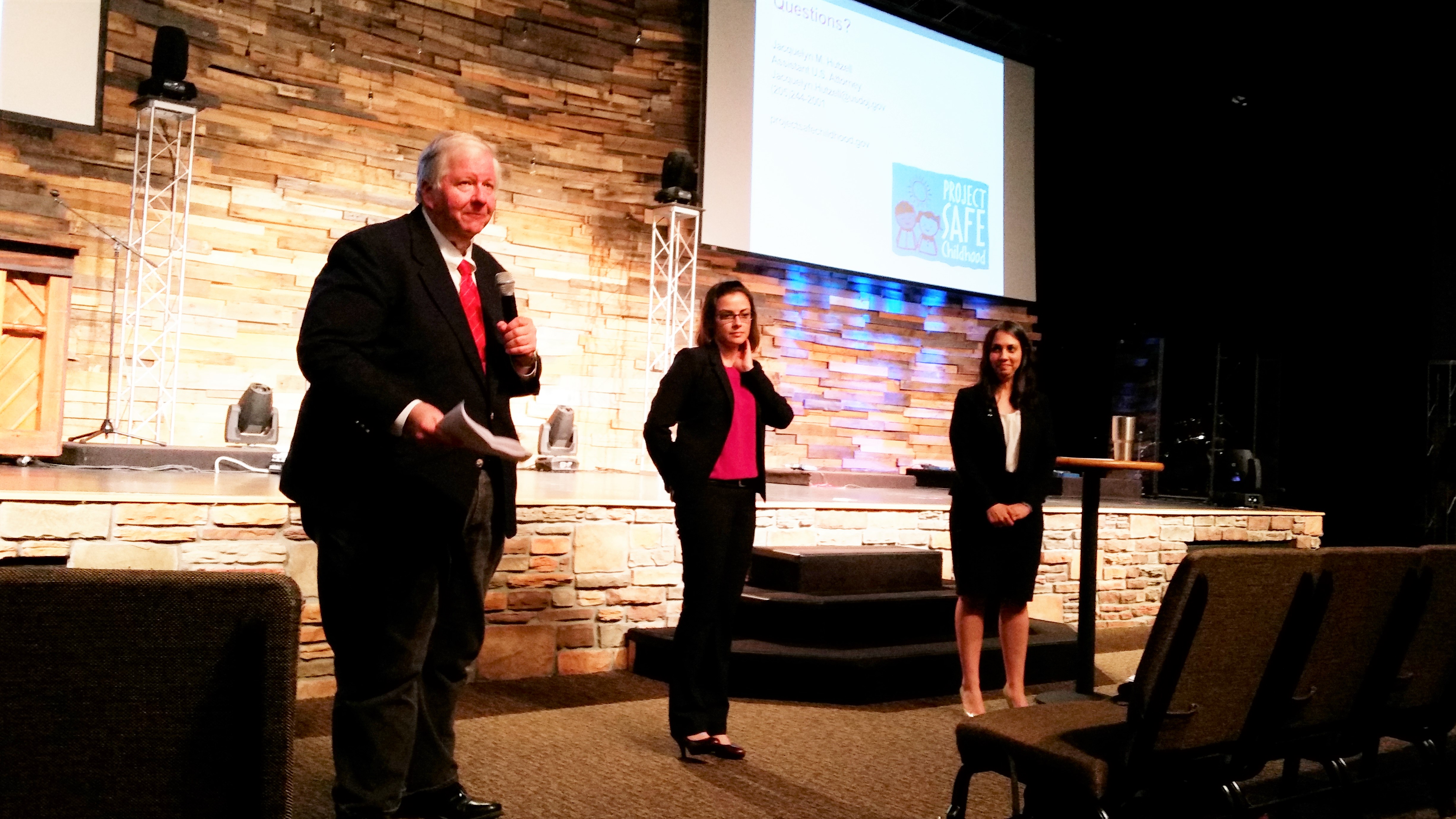My perspective is that predators are everywhere and they have direct access to your children through their computers and through their cell phones.”Assistant U.S. Attorney Jackie Hutzell
GOOD HOPE – On Thursday night, March 31, an Internet Safety training session was presented by Assistant U.S. District Attorney Jackie Hutzell and included information about cyber bullying, cyber security, social networking and the dangers of sexting. The free event, held at Daystar Church in Good Hope, was sponsored by the Cullman County Human Trafficking Task Force, Judge Kim Chaney, Cullman Children's Policy Council and the U.S. Attorney's Office Northern District of Alabama.
“My perspective is that predators are everywhere and they have direct access to your children through their computers and through their cell phones,” Hutzell stated at the beginning of her presentation. “What about your kids’ perspective? They think, ‘I know more about this than you do, what could go wrong?’ That is one thing I am going to primarily talk to you about today is what CAN go wrong; a LOT can go wrong.”
Hutzell began her presentation by talking about the various apps kids tend to have on their smart phones and how those apps can be dangerous. Apps such as Kik, SnapChat, Ask.fm and Poof! provide possible online predators easy access to children. She recommended parents know what the apps are and be the ones to download the apps onto the children’s phone or computer. She also recommended apps require a password that ONLY parents know.
Children who use social media could be involved in risky behaviors, such as sending mean or rude messages, sharing inappropriate photos, talking about adult subjects or visiting adult websites.
There are several signs that can help parents figure out if their children are at risk.
- Large amounts of time online, especially at night
- Pornography on the computer
- Receives/sends mail or gifts from people you don’t know
- Receives/makes phone calls from/to unknown people or numbers
- Turns computer screens off or changes the screen when parents come enter the room
- Withdrawn from family
- Using an online account belonging to someone else.
Online predators are individuals who commit child sexual abuse that begins or takes place on the internet. A good rule of thumb for children, as well as adults, is to know who your online friends really are; be friends in person long before you become friends with them online.
“Anyone can be an online predator,” Hutzell explained. “The benefits of being anonymous online are that you don’t necessarily know who you are talking to.”
There are ways to help recognize online predators. They are usually male and are honest about being adults. They target both females and males. They are clear about their intentions and are attracted by certain behaviors.
Children are vulnerable to online predators and sometimes they are victims of sextortion. Sextortion is a serious crime that occurs when someone threatens to distribute private and sensitive material if the victim does not provide them with images of a sexual nature, sexual favors or money. The perpetrator may also threaten to harm friends or relatives by using information they have obtained from the victim’s electronic devices unless the victim complies with their demands.
“It is easy to become a victim. Online perpetrators might gain your trust by pretending to be someone they are not,” Hutzell stated. “They lurk in chat rooms and record young people who post or live-stream sexually explicit images and videos of themselves or they may hack into your electronic devices using malware to gain access to your files and control your web camera and microphone without you knowing it.”
Sexting is a crime, even for minors. According to the law, a teen that takes a nude photo of another teen or sends his or her own nude photos out via a cell phone or over the internet can be prosecuted for child pornography crimes and be added to the nation’s registry of sex offenders. Keep in mind; no one can be sure of where the image will go once sent. 1 in 5 students will send photos to someone else and over half of those people send these images to more than one person. Before a child knows it, the whole school could have his or her ‘private’ image. That same picture could end up in a predator’s hands.
Cyberbullying is when a child, preteen or teen is tormented, threatened, harassed, humiliated, embarrassed or otherwise targeted by another child, preteen or teen using the internet, interactive and digital technologies or mobile phones. It has to have a minor on both sides or at least have been instigated by a minor against another minor. Once adults become involved, it is plain and simple cyber-harassment or cyberstalking.
If a child is being cyberbullied or is a victim of an online predator they should notify a parent, police officer, school counselor, teacher, friend’s parent or an aunt or uncle.
There are things parents can do to help prevent their children from becoming victims of cyberbullying and sextortion.
- Build dialog and talk about internet safety with your children.
- Be aware of how the computer is used.
- Have conversations and remind your kids who is looking at them online – teachers, law enforcement, future employers, online predators, etc.
- Establish rules and guidelines.
- Observe what kids do online.
- Use privacy settings.
- Communicate concerns about safety and being safe when communicating online.
- Connect with others in your community and expand your horizons by sharing your experiences with other parents in order to increase the visibility of these issues for other parents of teens.
With all the advances in computer and telecommunication technology, children are able to do and see lots of wonderful things – the sky’s the limit. Unfortunately, it also makes them vulnerable to exploitation and cyberbullying. Thankfully, many children will be protected as a result of people like Chaney and Hutzell, who go above and beyond the call of duty every day to raise awareness of the possible dangers of combining children with the internet.
To learn more, visit:
- The Cullman Children’s Policy Council at https://www.facebook.com/cullmanchildrenspolicycouncil/.
- The Cullman County Human Trafficking Task Force at https://www.facebook.com/Cullman-County-Human-Trafficking-Task-Force-870585096352748/?fref=ts.
- The U.S. Attorney's Office Northern District of Alabama at https://www.justice.gov/usao-ndal/project-safe-childhood.



















